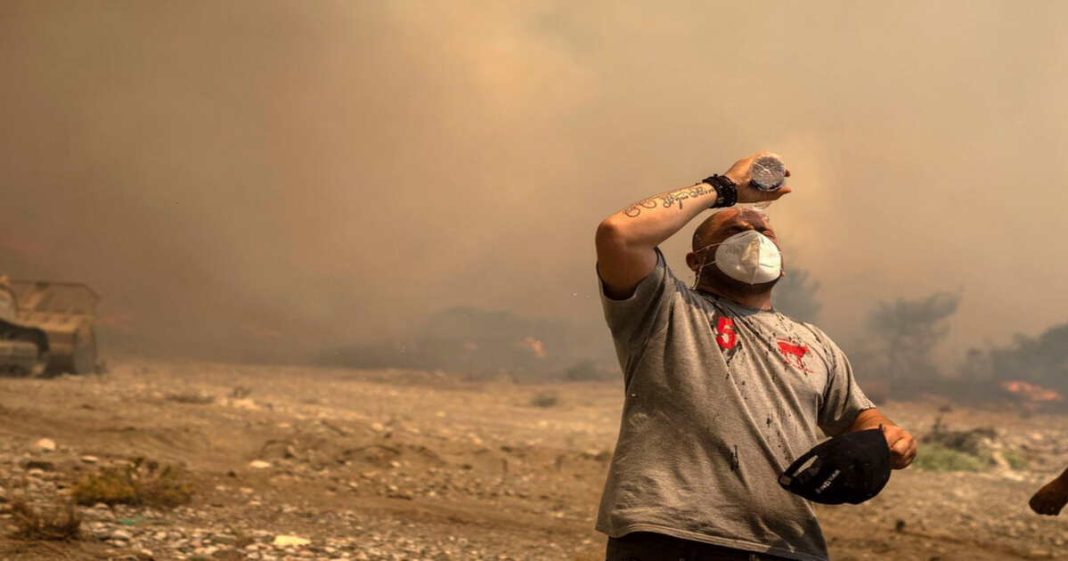A new UN report warns that without more aggressive action, global temperatures could rise by as much as 3.1°C by 2100, far above the 1.5°C target set in the Paris Agreement. This annual Emissions Gap report from the United Nations Environment Programme (UNEP) reveals that, despite pledges made nearly a decade ago, countries’ current commitments are not sufficient to limit warming to safe levels. The report shows that if only existing policies are implemented, the world will see an increase between 2.6°C and 2.8°C — still well above the agreed-upon limits to avoid severe climate impacts.
Read More: Pakistan Seeks $1.5 Billion IMF Loan to Combat Climate Change
With the world already warming by approximately 1.3°C, the risk of further temperature rise threatens to accelerate extreme weather events, including intense heatwaves, flooding, and significant impacts on ecosystems. The report emphasizes the gap between current policies and the drastic emissions cuts needed, a gap that UN Secretary-General Antonio Guterres called “a planetary tightrope” that demands immediate action to bridge.
Emissions on the Rise
Between 2022 and 2023, global greenhouse gas emissions climbed by 1.3% to reach 57.1 gigatonnes of CO₂ equivalent, a new record high. Factors driving this increase include a resurgence in air travel and a 19.5% rise in aviation emissions compared to pre-pandemic levels. UNEP scientists also noted a rise in demand for road transportation and cooling systems as global temperatures surge, particularly in regions experiencing extreme heat.
The shift toward electric vehicles and heat pumps has increased demand for electricity, often sourced from fossil fuels, which can inadvertently contribute to emissions. According to Anne Olhoff, UNEP’s chief scientific editor, these trends add complexity to reducing emissions and reinforce the need for comprehensive, multi-sector climate strategies.
Urgency for More Ambitious National Plans at COP29
The upcoming United Nations climate summit (COP29) in Baku, Azerbaijan, presents an opportunity for countries to increase their climate ambitions. Nations will be revising their Nationally Determined Contributions (NDCs), and the report urges these new plans to incorporate a 42% emissions reduction by 2030 and a 57% reduction by 2035 to stay within reach of the 1.5°C goal. Guterres reiterated the critical need for these targets in his message, emphasizing that failure to act now would lead to “climate disaster.”
Countries are expected to update their NDCs by early 2025, but the UN warns that delays in implementation are undermining progress. Inger Andersen, UNEP’s executive director, cautioned against complacency, stating that “even a small fraction of a degree avoided counts in terms of lives saved, economies protected, and biodiversity conserved.”
Pathways to Mitigate Emissions
The Emissions Gap report outlines a range of strategies to close the emissions gap. Renewable energy, especially from solar and wind, could provide up to 27% of the necessary reductions by 2030 and 38% by 2035. Forest conservation and restoration also offer a significant potential impact, accounting for about 20% of the required reductions for each year. Transitioning away from fossil fuels, boosting energy efficiency, and electrifying sectors like transportation and heating are critical measures.
The financial implications, while daunting, are manageable within the global economy, the report suggests. A six-fold increase in climate finance investments is needed, estimated at $0.9 to 2.1 trillion annually, which the UN argues is feasible within the global financial system’s $110 trillion scope. However, UNEP stresses that international cooperation and private sector involvement will be essential in securing the necessary funding.
Read More: Climate protest targets Taylor Swift’s and other private jets at UK
The report singles out the G20, responsible for the lion’s share of global emissions, as critical players in climate action. While some progress has been made in these countries, the report notes that current NDCs remain insufficient. “The largest-emitting members need to lead by increasing action and ambition,” UNEP stated.














